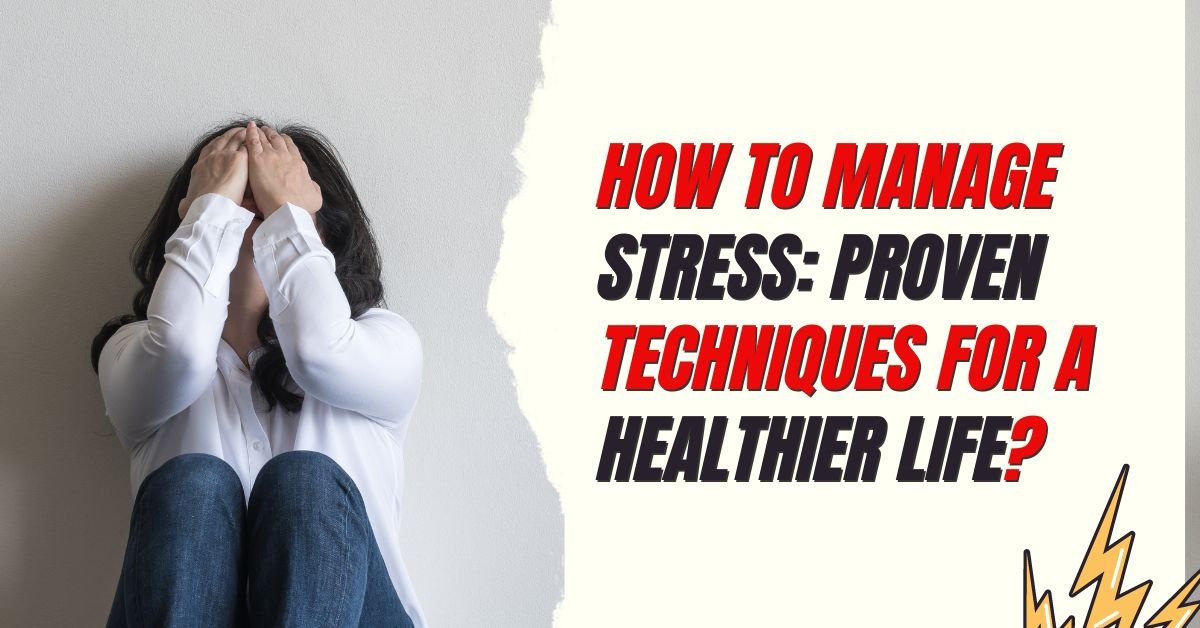Introduction
How to Manage Stress: Proven Techniques for a Healthier Life. For many people in today’s fast-paced environment, stress has become their regular friend. Stress can rapidly affect our mental and physical health regardless of the source—personal issues, deadlines for our jobs, or financial strains. Untreated, it can cause major problems including anxiety, sadness, and chronic diseases.
Managing stress is not just a luxury but also a necessary ability for leading a good life. This page will go over tried-and-true methods for managing stress, enhancing your well-being, and guiding a happier, better life. Discover how you could include stress management into your everyday schedule by continuing to read.
1. Understanding Stress
What is Stress? Definition and Types
Any pressure or difficulty the body responds naturally to stress. One can react physically, emotionally, or mentally. Although most people regard stress negatively, not all of it is harmful. Two basic forms exist: **acute stress**, which is transient and usually a reaction to an immediate threat, and **chronic stress**, which, if left uncontrolled over time can cause major health problems.
The Science Behind Stress: How it Affects the Body and Mind
Your body releases chemicals including cortisol and adrenaline when you find yourself in a trying circumstances. By raising your heart rate, increasing energy levels, and sharpening your focus, these hormones equip your body for a “fight or flight” response. Although this reaction is useful in brief bursts, extended stress hormone exposure can have harmful consequences on the body and mind, resulting in tiredness, worry, and even long-term medical disorders.
Common Sources of Stress: Work, Relationships, and Life Events
Stressors are the numerous causes from which one can get stressed. One of the most often occurring sources of work-related stress—which could be brought on by tight deadlines, demanding tasks, or office conflict—is Relationships—with friends, relatives, or a spouse—can also be a major source of stress. Important life events including relocation, career change, or bereavement can also induce stress that compromises your general state of health. Knowing these triggers will help you to more effectively identify and manage stress.
2. Recognizing the Signs of Stress
Physical Symptoms of Stress
Stress shows itself in the body in several ways. Typical physical complaints include stomach problems, muscle tension, headaches, and tiredness. A compromised immune system might cause changes in appetite, sleep problems, or recurrent illness for certain people. Often the first signals your body is under stress are these physical ones.
Emotional and Mental Indicators of Stress
Emotionally, tension can cause anxiety, irritation, or melancholy. You might discover that you have trouble focusing, that you get overwhelmed or quickly annoyed. Typical mental indicators of stress are racing thoughts, forgetfulness, or persistent anxiety. Early recognition and treatment of these emotional and psychological signs can help you to influence your daily life and decision-making.
The Importance of Early Detection
Prevention of more major health problems depends on the early identification of stress symptoms. Identifying the symptoms will help you to control stress before it gets out of hand. This could call for adjusting one’s lifestyle, using relaxing techniques, or seeing a specialist. Better general health and a more balanced existence might follow from knowing and appreciating your degree of stress.
3. Proven Techniques for Managing Stress

1. Mindfulness and Meditation
Meditating and mindfulness are two quite successful techniques for managing anxiety. Being here right now helps you avoid letting worries about the past or the future overwhelm you. Simple meditation methods such as focused breathing or guided imagery can help you to calm your head. Regular practice even for a few minutes can significantly alter your stress response.
2. Physical Activity and Exercise
Exercise is one natural method to unwind. Physical activity releases endorphins—chemicals in the brain that act as natural analgesics and mood enhancers—regardless of the form—fast walking, yoga, or a gym workout. Apart from helping you reduce stress, regular exercise improves your general physical condition, therefore improving your resilience to approaching demands.
3. Healthy Eating Habits
Your emotions alter depending on what you eat. A well-balanced diet heavy in fruits, vegetables, whole grains, and lean proteins can help to steady your energy and mood. Some foods—like those high in omega-3 fatty acids—are proven to reduce stress. Conversely, too much sugar, caffeine, or junk food can worsen anxiety and irritation, hence it’s important to pick carefully what you eat.
4. Time Management and Organization
Good time control can help greatly lower stress. You can prevent the last-minute frenzy that usually results in stress by planning your chores, establishing priorities, and dissecting more ambitious jobs into reasonable steps. Learning to say no when needed or to assign chores will also help you keep control over your time and lessen personal pressure.
5. Social Support and Connection
Strong social ties help to reduce stress using a buffer. Spending time with friends, relatives, or loved ones offers emotional support and could help you see demanding events from another angle. Maintaining these relationships is essential for stress management and general well-being whether it comes to discussing your issues or just enjoying group activities.
6. Relaxation Techniques
Including leisure activities in your regular schedule will allow you to relax and better control tension. Stress can be rapidly reduced using techniques including deep breathing, progressive muscular relaxation, or even listening to calm music. Did you know Open AI launches revolutionizing Search Gpt? Developing a regular habit of relaxing guarantees that you will always know how to quiet your mind when anxiety strikes.
7. Professional Help
Sometimes controlling stress on your own can seem difficult. If stress is interfering with your everyday life, you might need professional assistance. Support groups, therapists, or counselors could provide you with tools and techniques catered to your particular circumstances. Expert help can make a big difference in how you manage and get beyond stress.
4. Creating a Stress Management Plan
Personalizing Stress Management Techniques
Everybody feels stress differently, hence your stress management strategy should be customized. Whether it’s time management, fitness, or mindfulness, start by determining which methods most speak to you. Think about your tastes, way of life, and past performance-wise successful strategies. Customizing your strategy guarantees that you will be more likely to follow through and get benefits.
Setting Realistic Goals for Stress Reduction
Reducing stress successfully depends on having reasonable, reachable goals. Sort your more general goals into doable chunks and create reasonable timelines. Whether your commitment is to regular meditation or bettering your work-life balance, establishing specific objectives helps you monitor your development and keep inspired.
Monitoring Progress and Making Adjustments
A good stress management strategy depends on your routine tracking of your development. Track your emotions, the strategies you are applying, and the outcomes you are noticing. Make changes without delay if something isn’t performing as expected. Being flexible helps you to improve your strategy and discover the finest approaches to control stress in your daily life.
5. Long-Term Strategies for a Stress-Free Life
Developing Resilience and Emotional Intelligence
One effective approach to control stress over the long run is developing resilience. Resilience lets you more readily adjust to change and recover from difficulties. Crucially also is emotional intelligence—that is, knowledge and control of your emotions. These abilities will help you to keep a more balanced emotional state and negotiate demanding events with more ease.
The Importance of Regular Self-Care Practices
Maintaining a stress-free existence depends on routinely including regular self-care into your schedule. Self-care activities may be anything that lets you unwind and rejuvenate—hobbies, time in nature, or a technology break. Giving self-care top priority guarantees that you will regularly be tending to your mental and physical health, thereby preventing stress from developing.
Maintaining a Balanced Lifestyle
Long-term stress management depends mostly on a balanced lifestyle. This entails juggling social events, personal leisure, and jobs. Make sure you’re not overloading yourself in one area since imbalance could cause burnout and higher stress. Maintaining balance can help you to keep stress within reasonable levels and lead to a more contented life.
Conclusion
Managing stress goes beyond simply responding to problems to include proactive measures toward a better life. You may greatly lessen the effects of stress on your well-being by knowing its nature, spotting its symptoms, and using tried-through strategies. Developing resilience and preserving equilibrium in your life will depend on you creating a customized stress management plan and pledging to long-term methods. Recall that managing stress is a road trip; with the correct strategy, you will reach a peaceful, more contented life.

